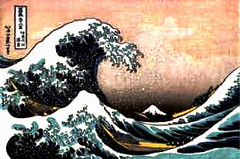ALA President bashes blogging
Today's adventure in the blog galaxy involved the discovery of this article: http://www.libraryjournal.com/article/CA502009
The incoming president of the American Library Association, Michael Gorman, bashed the heck out of us bloggers. I responded with this email:
Dear Mr. Gorman,
After reading your blog bashing article I sit amazed that you are the
president of such a venerable organization. I can only guess that you
wrote it in haste and did not share it with anyone for constructive
criticism. I have a question. How can you treat bloggers as a single
entity? There are over 6 million blogs. To me this is an example of
extremely lazy thinking. The word of the day: prejudice. I've been
blogging since early January of this year. Yes, one must sift thru
alot of fertilizer, but there is gold in this world. I still do not
pretend to completely understand it but I know that it is not easily
classifiable. You are in a state of denial. Mark Twain was the pen
name for Samuel Clemens. You might try reading him some time. Blogging
is the new "wild west" in the web and clearly mirrors the neural web
in our brains. It is a tidal wave of expressed freedom threatening to
drown your repressed ideas. Let them go, surrender, and join the
present.
Sincerely,
Mike Didj
bardosurfer.blogspot.com
Later on in the day I found a great web site which I sent to Mr. Gorman:
http://www.pointlesswasteoftime.com/monkeysphere.html
The monkeysphere concept helps me understand the ALA president. I have not gotten a response and actually do not expect one. I doubt he read it. My feeling is he was probably overwhelmed by a blogger backlash.
The incoming president of the American Library Association, Michael Gorman, bashed the heck out of us bloggers. I responded with this email:
Dear Mr. Gorman,
After reading your blog bashing article I sit amazed that you are the
president of such a venerable organization. I can only guess that you
wrote it in haste and did not share it with anyone for constructive
criticism. I have a question. How can you treat bloggers as a single
entity? There are over 6 million blogs. To me this is an example of
extremely lazy thinking. The word of the day: prejudice. I've been
blogging since early January of this year. Yes, one must sift thru
alot of fertilizer, but there is gold in this world. I still do not
pretend to completely understand it but I know that it is not easily
classifiable. You are in a state of denial. Mark Twain was the pen
name for Samuel Clemens. You might try reading him some time. Blogging
is the new "wild west" in the web and clearly mirrors the neural web
in our brains. It is a tidal wave of expressed freedom threatening to
drown your repressed ideas. Let them go, surrender, and join the
present.
Sincerely,
Mike Didj
bardosurfer.blogspot.com
Later on in the day I found a great web site which I sent to Mr. Gorman:
http://www.pointlesswasteoftime.com/monkeysphere.html
The monkeysphere concept helps me understand the ALA president. I have not gotten a response and actually do not expect one. I doubt he read it. My feeling is he was probably overwhelmed by a blogger backlash.










2 waves:
Nice to hear from you Matt, thanks for the support. I believe the Gorman way of thinking is becoming obsolete. He's stuck in the past and makes himself a good target. I doubt he'll make it thru his term.
Hunter's exit lacked class.
Good luck on your blog. Send me the URL.
A Guide To The Expanding Blogosphere
John M. Moran
Digital Diary
February 3 2005
You can hardly follow the news these days without running into mention of blogs, bloggers and blogging.
But many people remain mystified by the blog phenomenon, despite the publicity. Small wonder, because so many news accounts fail to even mention what a blog is. You'd think it was just an ordinary noun, like toaster.
That's obviously wrong. The Merriam-Webster Online website named "blog" its No. 1 word of the year for 2004, based on the number of people looking up what it means.
In the interest of saving you time, here's the definition Merriam-Webster provides:
Blog, noun [short for weblog] (1999): a website that contains an online personal journal with reflections, comments and often hyperlinks provided by the writer.
That sums it up nicely. Most blogs are free-standing electronic journals written by average folks about some topic that interests them. Sometimes they're personal. Sometimes they involve hobbies. Sometimes they pertain to politics or tech or sports or a profession.
A relative handful of blogs are gaining prominence as independent publications with strong followings, similar to financial newsletters, printed fanzines and niche political newsletters.
The explosive growth of blogging has led to an equally explosive growth in blog readership. A recent survey by the Pew Internet and American Life Project found blog readership jumped 58 percent in the U.S. last year, representing about 32 million people, or roughly 27 percent of all Internet users.
If you're thinking you've been left behind, forget it. Only 38 percent of Internet users even know what the term "blog" means, according to the Pew study.
What's more, knowing the definition and truly understanding the blogging community - commonly known as the "blogosphere" - are two different things.
Just where is this blogosphere anyway? How can you locate online journals that might interest you?
Finding interesting blogs can be a chore. A Google search is probably the easiest method. Start by picking a topic that interests you, and then add the word "blog" to that keyword while searching.
For example, if you're interested in politics, type "politics blog" (minus the quotations) into Google, and you'll be pointed to, among other things, a directory of dozens of blogs across the political spectrum maintained by ETalkingHead.com.
For a more targeted approach, try some of the blog-specific search engines out there. Blogwise maintains a searchable listing of thousands of blogs across the world. BlogSearchEngine.com lets you search for topics and, if you scroll down the homepage, offers listings by categories. Yet another good blog launching point is Daypop.com.
Once you've found a blog that interests you, it won't be long before you find many more. The blogosphere is notoriously self-referencing, so one blogs frequently point to each other's Web addresses and refer to each other's postings.
Not surprisingly for an Internet-based medium, many blogs are devoted to technology topics. One of my favorites is Engadget, a blog dedicated to chronicling the dizzying array of new gizmos hitting the market. Another blog-like publication is Slashdot, which is a kind of clearing house for tech news and commentary.
After you've read a few blogs, you may think about creating one yourself. After all, who hasn't dreamed that the world might be interested in their thoughts and opinions?
Creating a blog is easy, and there are plenty of resources to help. A good one is Blogger.com, now owned by Google, which gives step-by-step instructions.
Just keep in mind that creating a blog is far easier than maintaining one. You'd be amazed at how much time bloggers spend in tending to their online journals. If you've got the time and energy, it can be an immensely rewarding experience to share your ideas with the world.
John Moran's e-mail address is moran@courant.com.
Copyright 2005, Hartford Courant
Post a Comment
<< Home